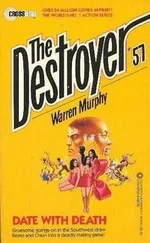"How lucky for you," said Remo. He leaned over the railing atop the low wall and tugged on Helena's sleeve. She was sitting on the right side of the box, Skouratis sandwiched between her and her father in purple-velvet chairs. She turned and her face soured when she saw Remo.
"You do not know where you are not wanted, do you?" she said.
"Yes, I do," said Remo. "I'm not wanted here. Gunga Din just told me but, against his better judgment, invited me to be his guest for the evening. As long as we're going to be neighbors, I thought we might as well be friends, you and I."
"Go away, American." Helena turned in the chair, her back firmly toward Remo, and put her left fingertips on Skouratis' neck. The swarthy Greek looked up at her and smiled. He leaned close and whispered to her and she laughed. Thebos meanwhile was leaning over the railing, signaling to people on the auditorium floor below.
The crowd hushed as an amplified drum roll reverberated through the auditorium. People settled back into their seats. Remo stood up to look down into the pit of the arena, where he saw five men, dressed in gladiatorial costumes, move out onto the floor. Some carried swords; others spears and nets. Thebos was restaging the Roman games.
Four of the gladiators were white. The fifth was a black man, a huge black man whose muscles had been oiled and who glistened under the high-intensity overhead lights. As the men moved around the arena, a tremendous roar of awe and approval greeted the black warrior.
Remo glanced at Thebos who was sitting back in his velvet chair, his face displaying a satisfied smile. Around the balcony, ambassadors and their guests in VIP box seats moved forward in their armchairs to lean over the rails and watch the combat below. The crowd in the lower seats roared its approval. The five gladiators moved around the arena in a line until they were below Thebos' box, and then they pointed their weapons toward him in a salute. Remo saw Thebos nod to the gladiators. Skouratis, his arm around Helena's shoulders, moved his chair forward. Helena glanced back to see if Remo was watching. When she saw he was, she moved even closer to Skouratis at the rail.
Thebos had an expression below the smile on his face as he looked out onto the crowd. Remo analyzed it for a moment, then knew it for what it was. It was pity. For the gladiators? The look deepened when the crowd roared again. No, pity for the delegates. The descendant of the glory that was Greece smiled as he acknowledged the delegates' warm reception of his reminder of the brutal and stupid grandeur that was Rome. How appropriate, his face said, that one pack of illiterate ignorant brutes should cheer the memory of another.
Remo agreed. He moved up to the railing, pushing aside the Indian ambassador who huddled there with his two blondes, his hands busy in their laps, watching the action below.
The five gladiators paraded once more around the arena. Then they squared off to battle. Two small white men faced each other. The black giant, holding a spear and net, faced two men, both armed with sword and shield.
The crowd expressed its approval of the black man; they cheered as he paraded before them; roared as he flexed the muscles in his huge back. Silence descended on the crowd, like the dropping of a curtain, as the two white men approached the black man. One feinted with a sword. The black man slipped trying to jump out of the way. He fell backward, hitting his head on the floor with a loud thunk and dropping his spear. One of the two white men danced in lightly and touched the point of his sword to the black man's belly, then looked up for a referee's judgment. The referee nodded, a clean kill.
The crowd booed. The two white men who had faced the black ignored them, and faced off against each other. The black man got up rubbing the back of his head, then turned a slow circle, facing the crowd, his arms raised overhead in a gesture of victory. He was loudly cheered. Remo glanced at Thebos. The Greek was leaning far back in his chair, laughing uproariously, and Remo decided that he was not a nice man. Nice was not shoveling it in the faces of diplomats too stupid to know what it was.
Skouratis was not laughing. He was still talking to Helena, his right hand looped over her shoulder, his left hand on her knee. He whispered easily into her ear.
Remo watched for long minutes. She did not once turn to see if he was looking.
After the gladiators had left the arena, the lights dimmed, and when the giant cake came out, the whole arena stood on tiptoes to see the largest cake ever baked.
The cake was white, like the hull of the Ship of States, on which they were all headed toward Africa. A John Deere tractor hauled it on a flatbed, six times the length of a mobile home. In the program, guests were informed that enough egg whites had been used to keep three American farms working a half year, along with fifteen tons of flour and eighteen hundred pounds of sugar. The cake itself had to be applied over aluminum rigging that held it, otherwise the center of the cake would have been as hard as rock from the pressure of the tons of cake above it.
There were real lights on the superstructure of the pastry ship and each deck had sugar and marzipan coating, the entire production of that sweet from Belgium and Luxembourg.
The cake itself, rumor had it, cost two hundred and twelve thousand dollars to bake. So immense was the model ship that the cake pieces, used like building blocks, could not be baked but had to be air blown into molds. The engineer who designed it got paid twenty-one thousand dollars in commissions, the usual ten-percent architect's fee. It was the size of a double garden apartment in Queens.
An orchestra greeted it with a Greek tune. Only one thing differed in appearance between the giant ship grinding its massive way toward Africa and the sugary model on the arena floor. And this was black letters, each the size of a forty-year-old oak. Besides the lights and the aluminum superstructure, they were the only uneatable things on the cake ship. And when the ship was towed to the center of the floor, imbedded lights in the black-plastic letters flashed on, as if offering a message from the gods in dark space. And the word was: SKOURATIS.
It flashed like lightning in the arena. And from all the loudspeakers came the voice of Aristotle Thebos.
"Skouratis," he said. "Forever let the greatness of this ship bear his name. Demosthenes Skouratis. This party honors Skouratis. This cake honors Skouratis, as does this great ship. Let this ship be forever Skouratis and Skouratis be the ship. From this day forth, the class of this ship shall be known as Skouratis. This vessel, this gift to the world of Demosthenes Skouratis, shall henceforth be known as Ship of States of the Skouratis Class."
Applause rose like the thundering of gravel rolling down into a galvanized-iron valley.
And when Remo again looked at Aristotle Thebos, he was leaned far back in his chair, laughing so hard that tears streamed from his eyes.
CHAPTER FIFTEEN
"We want Skouratis! We want Skouratis!"
The chant started small, then built up and welled through the vast auditorium until it rattled off the high ceiling and seemed to echo the crashing of the waves outside the safe walls of Ship of States.
The chant started small because it had been started by just two men. They sat in low seats opposite the royal box and all night long Remo had watched them watch Aristotle Thebos. And when the cake came in and Thebos had delivered his speech, Remo saw him signal toward the two men with a motion of his right index finger. As Remo watched, one man left the other and walked quickly to a spot about forty feet away from his seat. And then they started:
"We want Skouratis."
Around them, voices picked up the chant until it was no longer a chanted request, but a roaring demand.
Читать дальше


